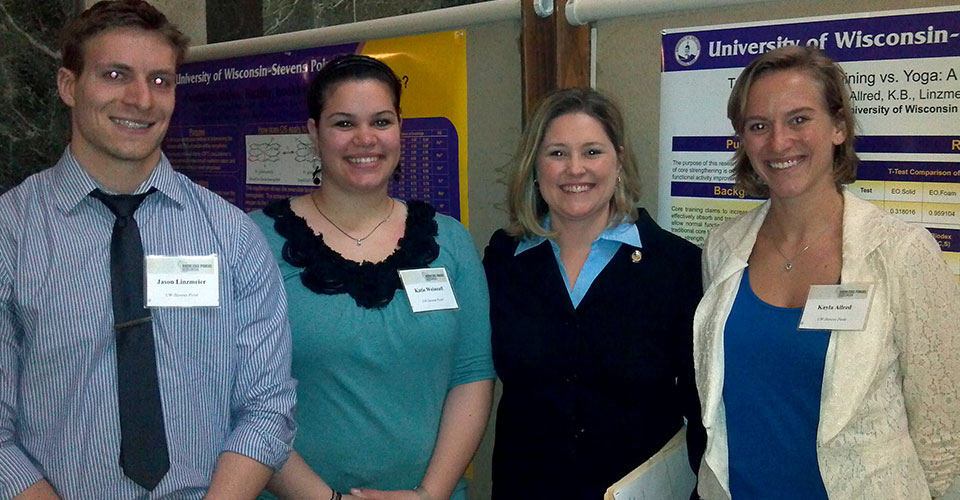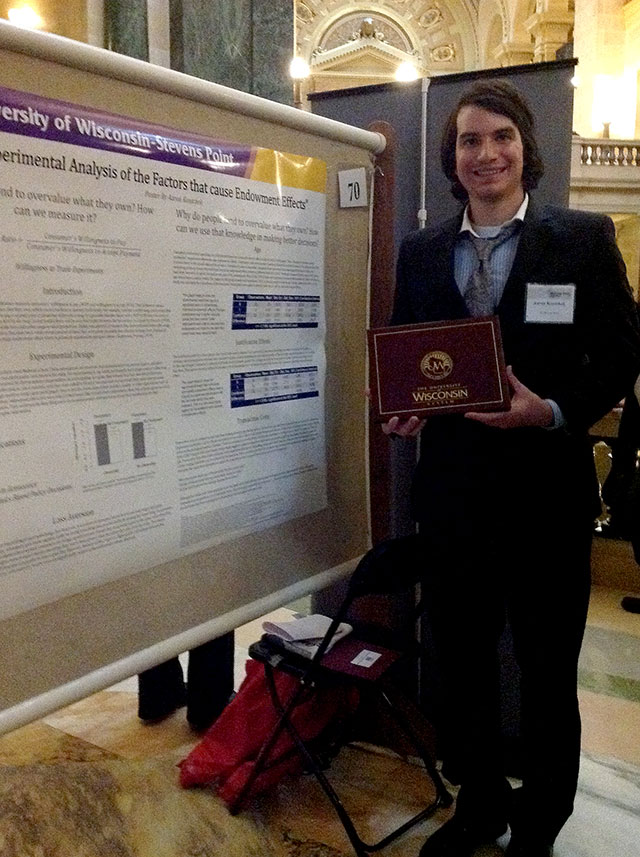

University of Wisconsin-Stevens Point students are sharing research findings during Posters in the Rotunda Wednesday, April 17, at the State Capitol in Madison. The College of Professional Studies was well represented with poster presentations by students from athletic training and economics:
Kayla Allred, Jason Linzmeier, Katie Weinzatl – School of Physical Education & Athletic Training
“Traditional Core Training vs. Yoga: A Comparative Study of Functional Performance”
Aaron Konichek – School of Business & Economics
“Experimental Analysis of the Factors That Cause Endowment Effects”
“The undergraduate research experience in the athletic training major is instrumental to student success and to the success of our profession,” said Holly Schmies, director of UW-Stevens Point’s Athletic Training Education Program. “We did research this year on topics that are not considered mainstream in athletic training, and it helped all of our students to look at things in a different way. It is our hope that by experiencing research early in their career, we can instill passion for life-long learning and encourage students to look for ways to advance the profession of athletic training.”
Studies show that undergraduate research leads to better job readiness, encompassing a broad range of student talents, interests and skills across academic disciplines. UW leaders believe broader participation in undergraduate research will provide students with the knowledge and skills they need for 21st century jobs, preparing graduates to succeed in a world that values innovation, problem-solving, teamwork and collaboration.
“Advancing undergraduate research projects has many important benefits—for the students, for the university and for the entire state. Students who collaborate with professors on meaningful research are more likely to stay in college and complete their degree. The hands‐on experience prepares them for professional success after graduation, and the added brainpower in our research projects provides a tremendous return on investment, including job creation and economic growth,” said UW System President Kevin P. Reilly.
Kayla Allred, Jason Linzmeier, Katie Weinzatl – School of Physical Education & Athletic Training
“Traditional Core Training vs. Yoga: A Comparative Study of Functional Performance”
Project Abstract:
Core training and stability is shown to increase the ability of the trunk to effectively absorb and transfer forces from the extremities to allow normal function, optimal spinal alignment, and increased functional performance. While traditional strength training is the predominate method used in performance settings to improve core stability, recent research has shown that yoga provides the same core strengthening benefits. In performance settings, yoga is typically utilized as a means to cross-train, decrease stress, or increase flexibility rather than a method to increase core stability and functional performance. The purpose of the research study was to determine which method of core strengthening is the most effective and will provide the greatest improvement in functional activities in a normal adult population. This study consisted of 17 subject (ages of 18-30) who were randomly assigned to either the yoga or the traditional core exercise programs. Both programs consisted of two 30-40 minute sessions for six weeks that were instructed and supervised by the principle investigators. The Harvard Step Test, Abdominal Plank to Failure and the Biodex Balance System were the testing methods utilized to assess cardiovascular fitness, core endurance and postural stability, respectively. Subjects were tested prior to starting and at the conclusion of the exercise programs. The final results revealed that both groups improved in all aspects functional performance. Although the results were not statistically significant, there were differences between the two groups. Specifically, the yoga group saw greater improvements in postural stability and cardiovascular fitness than the traditional core group. While both programs did show benefits to increasing functional performance, incorporation of yoga into traditional core programs may further increase cardiovascular function and postural stability.

Aaron Konichek – School of Business & Economics
“Experimental Analysis of the Factors That Cause Endowment Effects”
Project Abstract:
The recent economic literature has proven the existence of a so called “endowment effect” as a gap between consumers’ willingness to pay (WTP) and willingness to accept (WTA). The existence of endowment effects causes certain markets to not be fully efficient. While the literature identifies several economic factors responsible for the endowment effect, their relative influence on the size of the gap between WTP and WTA has not been established. Up to this point no experiment exists that is able to address the relative contribution of economic factors such as loss aversion, status quo bias, and transaction costs on the size of the endowment effects. I have conducted a series of experiments to determine the weight of the different economic factors that are part of the endowment effect. Thus, these experiments fill a critical void in the literature and expand our general understanding of why endowment effects exist and how to exploit or diminish their impact.
